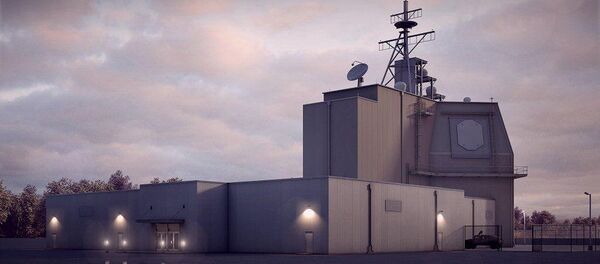WASHINGTON (Sputnik) – On Thursday, the US Aegis Ashore missile defense system was officially inaugurated at a military base in Romania, and the construction of a similar complex will begin in Poland on Friday due to be completed by 2018.
"The Pentagon’s deployment of a missile shield system in Europe is a dangerously misjudged move, assuming European security is indeed the objective," US historian and political commentator Patrick Smyth said on Thursday.
The deployment of the US missile shields in the two Eastern European nations, as with any other weapons system must be understood in the context of a deliberate long-term policy by Washington to increase tensions on the continent, Smyth insisted.
"Anyone not wedded to ideological illusions will recognize Thursday’s development as one more step—a large one this time—in Washington’s determined campaign to escalate tensions in relations with Russia—not least Europe’s."
US policymakers had been alarmed by increasing signs of warming economic and diplomatic relations between Russia and major European nations and wanted to derail that trend, Smyth maintained.
"In my view this is part of an effort to disrupt the salutary drift toward ever-greater density and interdependence in Western Europe’s relations with Russia. To me it is plain that the US wishes to restore the sharp demarcations, defined by animosity and distrust, of the Cold War."
US leaders had defended the missile interceptor deployments as intended to increasing the security of all NATO member states, but by increasing the dangers of conflict on the European continent, the policy would have the opposite effect, Smyth predicted.
"European security, it seems to me, is the stated objective but not the true intent here. There seems no question the Europeans—and of course Russians—are less safe Thursday than they were Wednesday."
King’s College, London War Studies Professor John Bew told Sputnik the controversial new deployments had so far received little attention from the Western European media and public.
"Honestly, most Europeans are more concerned about terrorism (and refugees) in the first instance, though an increasingly wary eye is being cast on Russia at the military level."
Bew said European defense policymakers were paying little attention to criticisms over the missile deployments and were now focusing instead on their growing uncertainties over Turkey’s future reliability within the alliance.
"Really Turkey is the wild card in all of this. Europe does not have a coherent line on this, and it is the strategic relationship to watch. The irony is that it is being held closer at precisely the moment it is least compatible and getting worse."



